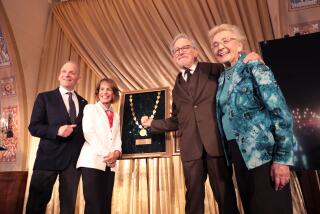‘The Diary of Anne Frank’ rings out at Italian soccer games in response to anti-Semitism
Reporting from Rome — “I see the world being slowly transformed into a wilderness, I hear the approaching thunder that, one day, will destroy us....”
The words of Anne Frank rang out over the loudspeakers at Italian soccer stadiums this week in a somber departure from the usual pregame festivities. Players wore shirts depicting her image and denouncing anti-Semitism. They handed copies of “The Diary of Anne Frank” to young fans.
The homage to Frank was a hastily planned response to an alarming display of anti-Semitism on Sunday when fans of Rome’s Lazio soccer team used images of the Holocaust victim to launch insults at rival supporters. The Lazio fans had plastered images of Frank dressed in the uniform of crosstown rival Roma, along with anti-Semitic slogans.
Using Frank’s image as an “insult and a threat” was “inhumane,” said Italian President Sergio Mattarella, while Israel’s sports minister, Miri Regev, described the stickers depicting Frank as “despicable.”
In a letter to her Italian counterpart, Regev wrote that insulting Roma players as Jews implied they were a “scourge to be avoided.”
In a bid to counter the anti-Semitic fans, Lazio players warmed up before their away game in Bologna on Wednesday wearing T-shirts with an image of Frank, the German Jew who wrote her famous diary while hiding from the Nazis in Amsterdam before she was caught and died at the Bergen-Belsen concentration camp in 1945.
During a visit to Rome’s synagogue on Tuesday, Lazio President Claudio Lotito presented a wreath of flowers and promised to take 200 young Lazio fans a year to visit the Nazi concentration camp at Auschwitz in Poland.
The club’s so-called Ultra group of hard-core fans have nursed neo-fascist sympathies for years, eulogizing Italy’s period of fascist rule under dictator Benito Mussolini. In 2001, Lazio fans held up a banner stating “Auschwitz Is Your Homeland; the Ovens Are Your Homes” at a game against Roma, which has traditionally been supported by Rome’s Jewish community.
Rome’s chief rabbi, Riccardo Di Segni, criticized Lotito’s visit to the synagogue as a publicity stunt. “This community is not a washing machine or a place where you can show up with a floral tribute and resolve everything,” he said.
On Wednesday morning, the wreath disappeared from the steps of the synagogue and was later seen floating in the Tiber River, reportedly thrown there by young members of Rome’s Jewish community unconvinced by the sincerity of Lotito’s stand against anti-Semitism.
Later on Wednesday, an Italian newspaper published a purported recording of Lotito on its website in which he says, “Let’s put on this performance,” in reference to the synagogue visit.
The full passage from Anne Frank’s diary that was read at games Wednesday says: “I see the world being slowly transformed into a wilderness, I hear the approaching thunder that, one day, will destroy us too, I feel the suffering of millions. And yet, when I look up at the sky, I somehow feel that everything will change for the better, that this cruelty too shall end, that peace and tranquility will return once more.”
Italian news reports said that after studying video from Rome’s stadium, police had identified 16 suspects they believe put up the images of Anne Frank, including three minors, one of whom was 13.
Before the Lazio-Bologna game Wednesday, fans, including 500 Lazio supporters, listened to the passage in silence before applauding. However, a smaller group of “Ultra” Lazio fans who had gathered outside the stadium sang fascist songs and gave stiff-armed fascist salutes.
Kington is a special correspondent.
ALSO
Catalunya Radio becomes a flashpoint in the independence movement in Spain
A global primal scream: #MeToo (#YoTambien #QuellaVoltaChe #גםאנחנו أنا_كمان#)
‘No Asylum: The Untold Chapter of Anne Frank’s Story’ revealed via her father’s letters
More to Read
Sign up for Essential California
The most important California stories and recommendations in your inbox every morning.
You may occasionally receive promotional content from the Los Angeles Times.










